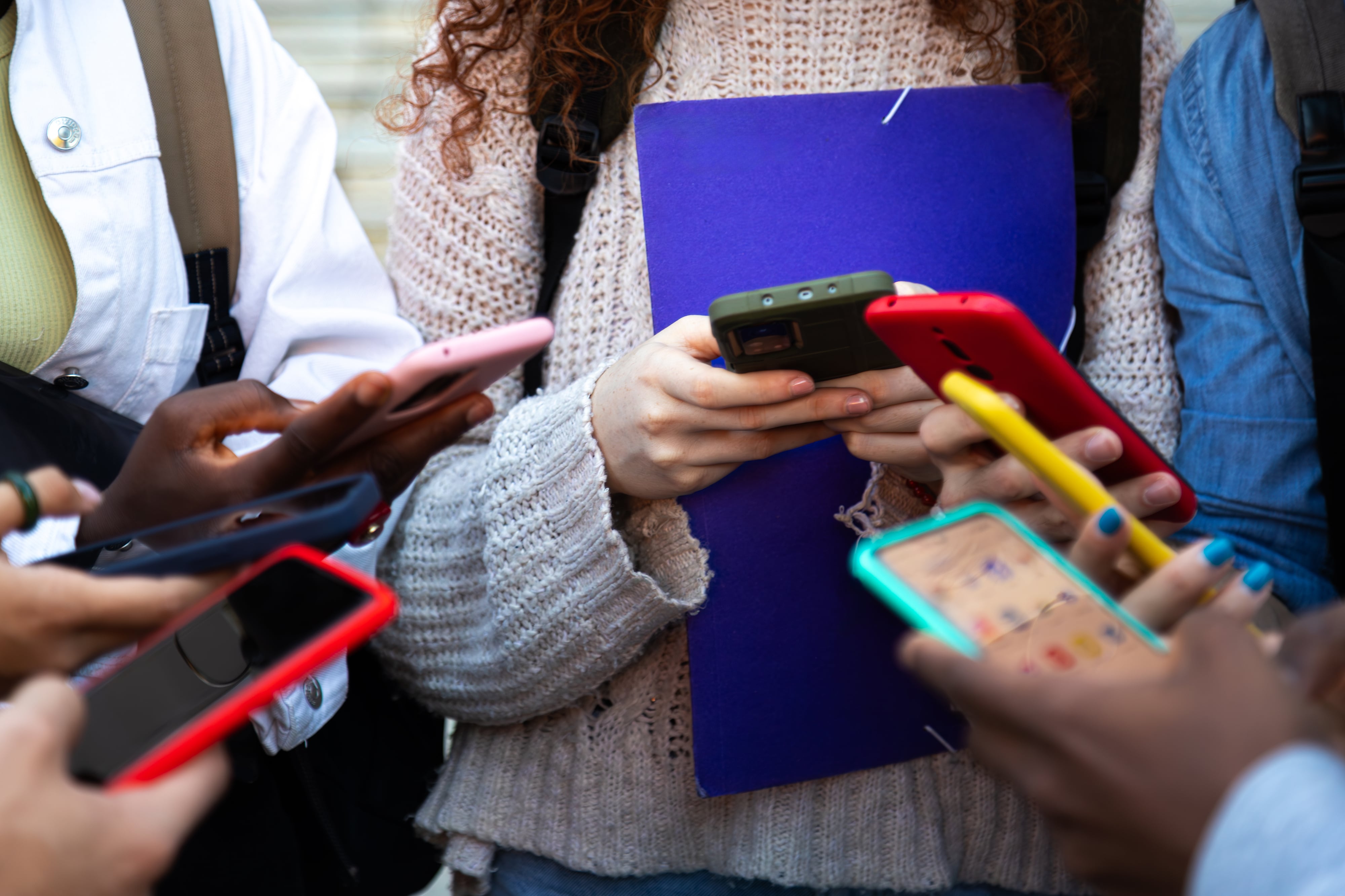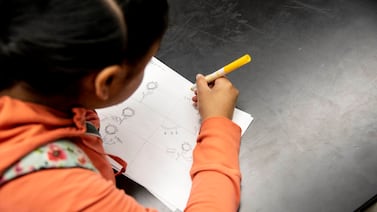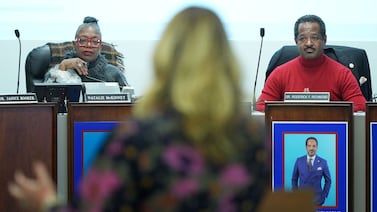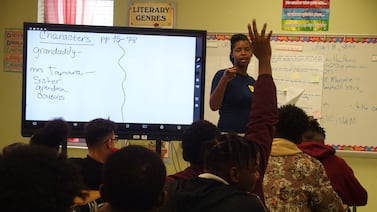Sign up for Chalkbeat New York’s free daily newsletter to keep up with NYC’s public schools.
As New York City schools await the details of a possible citywide school cellphone ban, a host of big questions remain.
At the top of the list for some educators, advocates, and students: How will schools collect phones from students? And what will they do when students don’t comply?
Officials have yet to make a final announcement about a cellphone ban, though several principals familiar with the Education Department’s plans told Chalkbeat last month that officials are weighing a citywide ban that would take effect in February. Schools Chancellor David Banks had initially promised to announce a policy by mid-July, but the details of a plan for the city’s 1,600 schools are not simple.
Proponents of a ban hope that a more consistent and proactive citywide policy could avert some of the daily conflicts over cell phones. But some advocates and educators worry that a citywide ban could simply multiply the number of conflicts, especially if teachers are still tasked with enforcement. That could lead to a spike in disciplinary responses such as suspensions, especially at first, some advocates say.
“Some students, they need to stay in contact with family members or just having that security next to them,” said Nelson Mar, a senior staff attorney at Bronx Legal Services. “I can see that this will lead to potentially more discipline-related cases and just more challenging situations in schools.”
New York City schools have been able to craft their own cellphone policies since a systemwide ban was lifted in March 2015. Roughly 500 of the city’s schools already have some type of cellphone ban in place, including some that require kids carry their phones around in locked pouches or stow them in cubbies in the morning, according to a recent survey conducted by the United Federation of Teachers. Conflicts over cellphones are commonplace in classrooms, many educators have told Chalkbeat.
“It’s the perfect situation for engaging in power fights,” said Martin Urbach, a music teacher and restorative justice coordinator at Boerum Hill School for International Studies in Brooklyn.
Students are often deeply reliant on their phones and leery of handing over expensive pieces of technology with lots of private information on them, while teachers are exasperated by having to nag students about keeping them put away during class, said Urbach. He estimates he’s mediated between 300 and 400 student-teacher conflict resolution sessions over cellphones in his eight-year career.
He’s especially worried about equity issues related to cellphone enforcement if a citywide ban is imposed.
“Most issues with school discipline in schools end up criminalizing Black and brown kids,” Urbach said.
Anita Pinto, a high school speech therapist in Manhattan, recalled a student responding with curses and threats of violence when she confiscated his phone.
“I gave it back,” Pinto said. “It wasn’t worth it. You have to pick and choose your battles. … Many teachers don’t take [phones] because of the way kids spin out when they’re taken away. It can get intense.”
An Education Department spokesperson declined to comment on how the city will handle student discipline for a possible cell phone ban.
“We’re continuing to engage with stakeholders and will have more to share soon,” spokesperson Jenna Lyle said.
Advocates push for more guidance on discipline
Under the current school discipline code for middle and high schools, schools can dole out a variety of consequences to students who violate their cellphone policies.
Students can be penalized for inappropriate use of technology, for using electronic devices without appropriate permission, and for bringing in items that violate school policy — none of which result in suspensions.
But schools have another path to suspend students: writing them up for insubordination for refusing to turn over their phone.
Suspensions for insubordination are relatively rare and require approval from Education Department higher-ups. In fact, concerns that schools were meting out excessive suspensions for “insubordination” and racial disparities in who received those suspensions led to discipline code reforms under former Mayor Bill de Blasio. There were around 900 suspensions for insubordination during the 2022-23 school year, according to Education Department data.
Michael Mulgrew, president of the United Federation of Teachers, the city teachers union, said he’s concerned that without specific guidance on how schools should respond to students who don’t comply, more kids could wind up with harsh punishments such as suspensions. He said he’s pushing the Education Department to focus on issuing clear guidance to parents and students so they understand the consequences of violating the policy before it goes into effect.
“Insubordination … can lead to very severe suspensions,” Mulgrew said. “I don’t think we should be putting that on a child’s permanent record.”
Mulgrew acknowledged that there must be consequences for students who don’t comply with cellphone bans, but said schools shouldn’t turn to suspensions.
He’s also pushing to ensure that teachers are not responsible for enforcing any citywide cellphone ban.
“That becomes a fiasco,” he said, “because then at the beginning of every class, the teacher would be spending 10, 15 minutes doing cellphone work, removing instructional time.”
Several advocates said they also frequently encounter students ending up in disciplinary trouble for conduct that involves their phone, such as recording an inappropriate video or cyberbullying.
Getting phones out of students’ hands during the school day might cut down on that behavior marginally, but likely won’t make a big dent since much of it happens outside school hours, said Rohini Singh, the director of the School Justice Project at Advocates for Children.
Another disciplinary tool in a school’s arsenal is calling in parents when there’s a conflict over a cell phone. But that can backfire because parents often rely on being able to reach their kids at school on their cellphones and may not want to give up that option, educators said.
“Students know there’s really not that much we can do,” Urbach said. “Kids are not going to get in trouble at home for not giving their phone to a teacher. Some kids might, but most will not.”
Cellphone bans draw mixed responses
The movement to ban cellphones in schools has picked up considerable momentum recently, as evidence mounts of the negative effects of phone use on young people. Multiple states have moved to make cellphone bans mandatory – a step that New York Gov. Kathy Hochul is considering. Some districts, including Los Angeles, have also committed to districtwide cellphone bans.
Some schools have turned to Yondr, a company that provides magnetized cloth pouches in which students can store their phones during the school day. But the system costs money, and some kids have figured out how to open the pouches, educators said. Other schools have students store their phones in cubbies at the start of the day. Most systems for collecting phones require schools to assign staff members to collect, keep track of, and return phones.
Shaël Flessel-Guirand, a 16-year-old rising senior and peer mediator at Boerum Hill School for International Studies, acknowledged that cellphone use in school can get out of hand, but doesn’t think a blanket ban is the solution.
As frustrating and exhausting as it can be, Flessel-Guirand thinks schools shouldn’t give up on talking to students about why they’re on their phones during school – whether it’s boredom, family or social obligations, or even a phone or social media addiction – and helping them learn healthier behavior.
“Taking away the possibility completely is not necessarily helping students,” she said. “We’re not focusing on the reason we’re using phones, just the fact we’re using phones.”
Amy Zimmer and Alex Zimmerman contributed.
Michael Elsen-Rooney is a reporter for Chalkbeat New York, covering NYC public schools. Contact Michael at melsen-rooney@chalkbeat.org .





